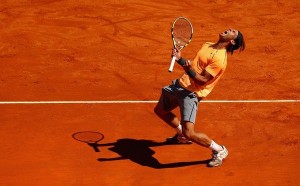You didn’t need to sit in on Novak Djokovic’s post-final press conference to know that he had, as he phrased it, “no emotional energy left.”
The world’s best service returner, and maybe the best-ever service returner, was a shadow of his greatness Sunday afternoon at Monte Carlo with the recent death of his grandfather still weighing on him.

It has been a long time since Rafael Nadal’s serve accounted for so many free points against Nole. Indeed, it has been a long time since Nadal has beaten Djokovic. What was it, 18 months and seven consecutive losses?
It had been so long that Rafa seemed numbed to the streak. But all of that is over now with this 6-3, 6-1 victory in the Masters Series final in Monaco.
This is as badly as Nole has ever been beaten (in terms of games won) in a match he’s been able to finish. Three other times he’s been held to four games won in his nine-year pro career — in 2003 to No. 415 Tudor Eniv by 6-1, 6-3; in 2010 by No. 12 Fernando Verdasco by 6-2, 6-2; and in 2011 by No. 5 David Ferrer by 6-3 6-1.
So this was way out of character for Djokovic. Nevertheless, the camaraderie between the two men was evident after the match as they patted each other’s back and spoke privately, no doubt Rafa consoling Nole on his grandfather’s death and Nole telling Rafa, “No worries. You won this. You deserve it.”
Afterward, Djokovic met with reporters and explained how he had considered pulling out of the tournament a few days earlier, but concluded that you can’t change life and that, as a professional, he had to plod on.
But it was evident from the beginning of this one-hour, 18-minute quickie that there was a lack of emotional motivation from the Serbian. Rafa won 85 percent of his first-serve points. The last time they played on clay, in Rome last year, Nadal won just 67 percent of his first-serve points. And the clay match before that, in Madrid, he won only 55 percent of his first-serve points.
That has been where Djokovic forges his edge on Nadal, by either neutralizing or taking immediate control of the points off his return of first serve, and certainly more easily off the second. But that Djokovic wasn’t there Sunday, and we all know why.
The numbers Nadal has run up at Monte Carlo are staggering and worth sharing:
* He now has eight straight Monte Carlo titles and 42 wins in a row, the last defeat coming to Guillermo Coria in 2004.
* In the 90 sets he’s played during the streak, he’s won 84, 18 of those by 6-1 and eight others by 6-love.
* During the streak he’s won 33 percent of his matches (14) over top-10 players and 19 over top-20s.
* In the eight finals he’s won, four came against No. 1 players — defeating No. 1 Djokovic in 2012, No. 6 Ferrer by 6-4, 7-5 in 2011; No. 12 Verdasco by 6-0, 6-1 in 2010; No. 3 Djokovic 6-3, 2-6, 6-1 in 2009; No. 1 Roger Federer by 7-5, 7-5 in 2008; No. 1 Federer by 6-4, 6-4 in 2007; No. 1 Federer by 6-2, 6-7 (2), 6-3, 7-6 (5) in 2006; and No. 9 Coria by 6-3, 6-1, 0-6, 7-5 in 2005.
While you can give Djokovic a bit of a pass for his emotional difficulties this past week, how about some consideration for Nadal, who went 15 days in a row without practicing in order to get his knee right before coming to Monte Carlo. He had to work his way into form in this tournament, and he did. He had only 10 unforced errors in the final and never lost a set.
And so it’s on to Barcelona for Nadal. Federer won’t be there and neither will Djokovic, who probably will take some off to get with his family and deal with the events of this past week. Yes, the death in the Djokovic family was significant, but so is this Nadal win, which gives us all a lot to look forward to in the next month and a half.
Charles Bricker can be reached at nflwriterr@aol.com
